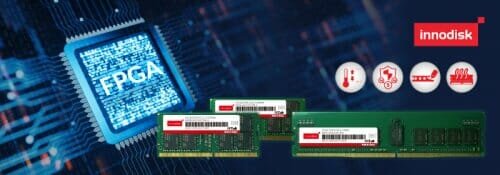Innodisk recently announced its industrial-grade DRAM modules for FPGA (field-programmable gate array) applications that open the door to new opportunities for system integrators and network operators.
Innodisk’s first-to-market industrial-grade DRAM modules for FPGAs provide wide temperature support, robust design, reliability, and complete form factor support with high capacity single or dual rank for AI and IoT applications.
FPGAs are a formidable choice for inference in embedded, edge computing, AI, and IoT applications. Highly customizable FPGAs offer greater performance with lower power consumption than general-purpose GPUs and give far greater flexibility for adjustment in the field than ASICs.
“We expect this to be a game-changer that can roll with the tide of AI,” said Samson Chang, Global DRAM Vice President of Innodisk. “Industrial-grade DRAM is key to the integration of FPGAs in applications like AI and IIoT.”
The $5.9 billion FPGA market is expected to see a 7.6% average annual growth rate over the next five years, fueled primarily by increased AI and IoT adoption. The moves of major industry players further support these indications of future growth. Intel’s $16.7 billion acquisition of Altera in 2015 was the first sign, and on October 27, 2020, AMD announced its $35 billion deal to buy Xilinx.
“Innodisk‘s DRAM modules provide large capacity, low-latency memory access for FPGAs,” Chang said. “And we provide complete form factor industrial-grade options for industries where reliability is tantamount.”
Features of Innodisk’s industrial-grade DRAM modules for FPGAs include:
• Single or dual rank—providing high capacity
• -40–85℃ temperature tolerance—surpassing stringent JEDEC standards
• Anti-sulfuration—guarding DRAM silver alloys against sulfur corrosion
• HumiSeal conformal coating—protecting from dust, dirt, and corrosion
• Side fill technology—bolstering chip-to-PCB solder joints.
“Since 2005, Innodisk has been innovating new DRAM and storage technology products for industry and embedded computers,” said Chang. “We’re proud of our DRAM modules for FPGAs because they anticipate and solve our customers’ future AI and IoT needs for FPGA systems.”








